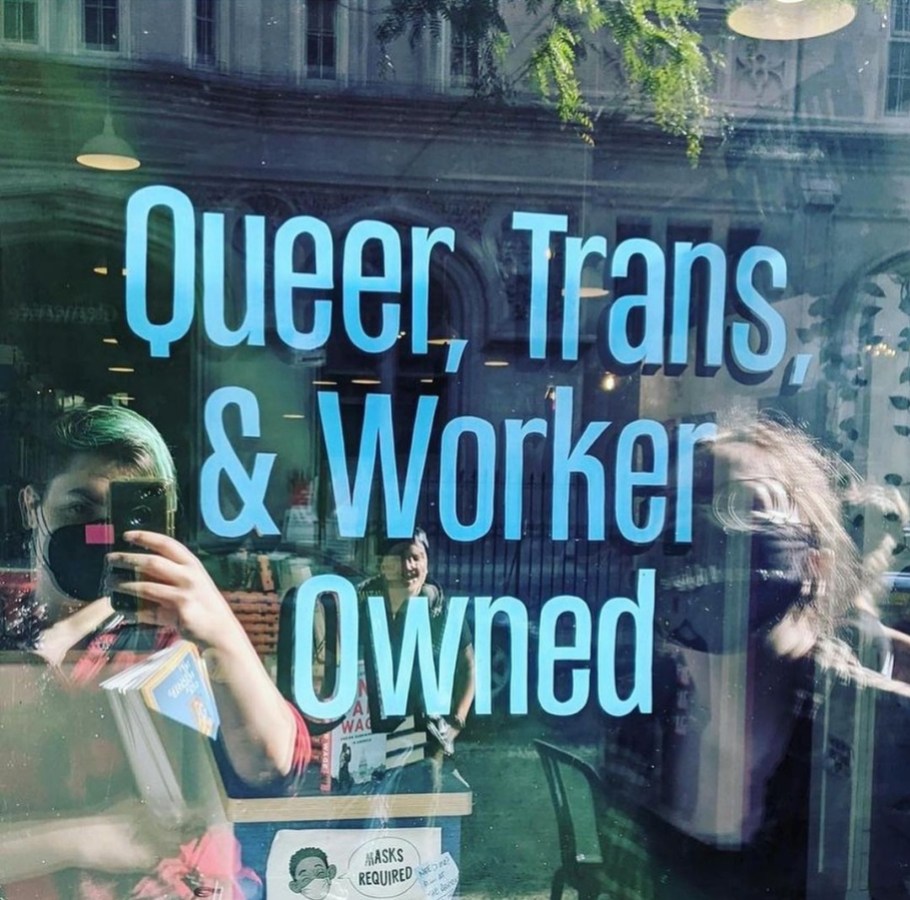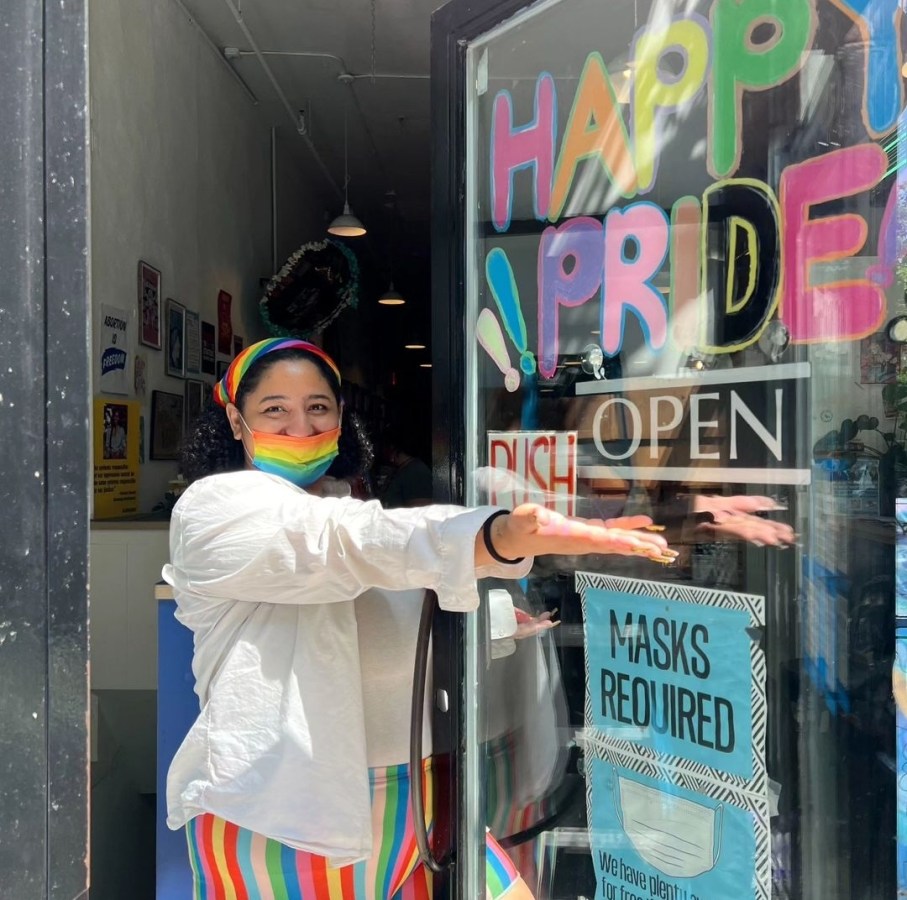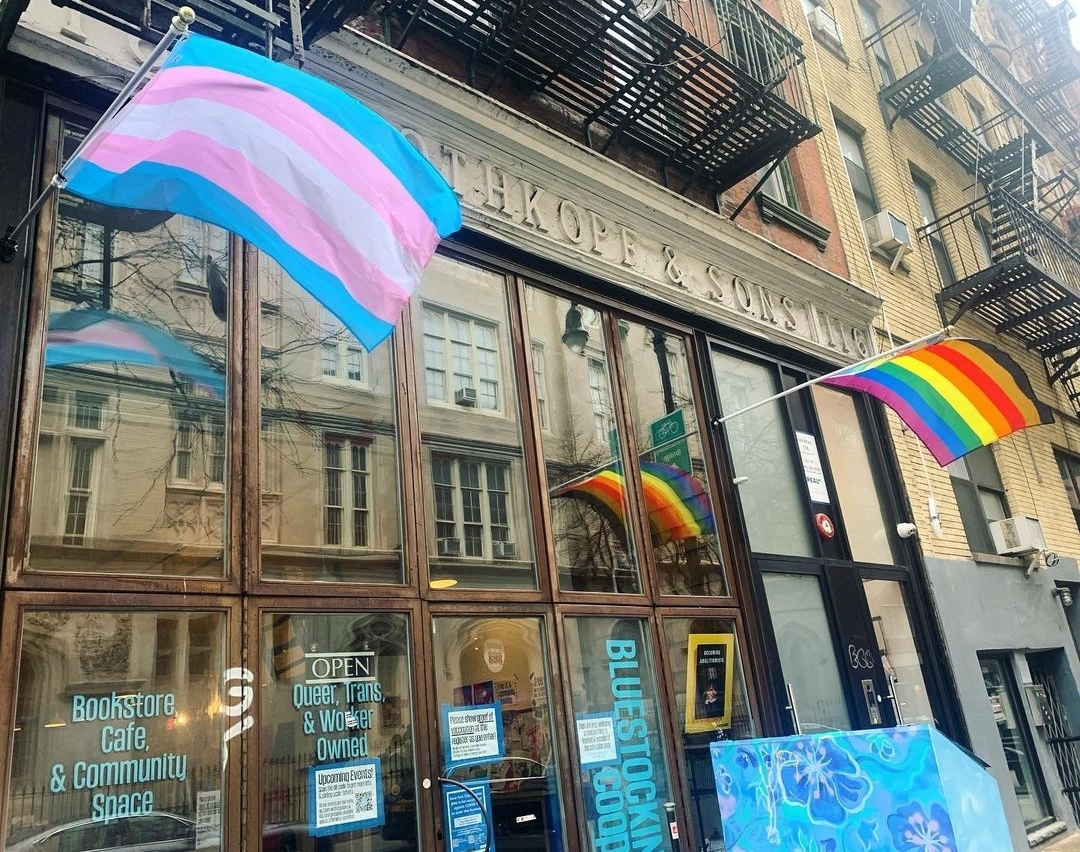all photos courtesy of Bluestockings Cooperative
To have a bookstore is to have the opportunity to create magic. It’s the opportunity to give people the words and stories they need. At their best, bookstores are built around the values of listening, being listening to, care, being cared for, and community. Because to write, read, and share stories is to reach towards others, to reach something beyond yourself. To me, that’s about as close to magic as you can get.
When I think of bookstores which best embody that magic, NYC’s Bluestockings Cooperative comes to mind. The space is queer, trans, and worker-owned, meaning they work from a cooperative model, following the guiding principles and wisdom of Black communist and leftist organizing in Harlem as well as the Borinquen organizations of Loisaida. Instead of having bosses or managers, each employee is a worker as well as a partial owner within the cooperative.
Together, these worker-owners are continuing Bluestockings’ longstanding mission grounded in the principles of abolition feminism, solidarity, and transformative justice practices. Their mission operates in three parts: 1. distributing literature and resources about oppression, intersectionality, community organizing, and activism by sharing the stories of marginalized people, 2. maintaining a space in New York City for dialogue, education, and reflection where all people are respected, and 3. building connections, knowledge, and skills in their communities.

You’ll see this mission reflected directly in the space and its practices. Masks are required and available for those who didn’t bring their own. As long as people are wearing a mask and abiding by Bluestockings Safer Space Policy, they can spend as much time as they want in Bluestockings sitting, browsing, and using the wifi without having to make any kind of purchase. One of the many toxic byproducts of late-stage capitalism is that warm, safe, free, indoor spaces where people simply exist with access to wifi and restrooms are becoming more and more difficult to find. This is especially true in New York City, as Mayor Eric Adams recently cut millions from New York City’s library budget forcing them to close on Sundays.
The shelves are full of books centering queer voices, intersectional feminist voices, abolitionist voices, and voices calling for liberation from colonialism. Behind the main counter there’s a “free store” maintained through a donation system with shelf-stable food, hygiene products, and first aid supplies. Through a government program, Bluestockings is also able to provide Plan B. All anyone needs to do to access these resources is ask. According to worker-owner Al (they/them) who is responsible for building out their free store, “I’ve ordered and disturbed 2,496 Plan B doses to date. We take surveys on our free store and on average we service 75-100 community members who utilize the snacks and protein drinks as well as our sanitary products and hand warmers.”
In addition to its inventory choices and free store, Bluestockings practices care towards its community by providing free Narcan training and fentanyl test strips. Given that fentanyl (a powerful opioid up to 100 times more potent than morphine and 50 times more potent than heroin) cannot be detected by sight, taste, smell, or touch, fentanyl test strips can be life-saving. Naloxone (the brand name version of Narcan) is a medication that blocks opioids in the brain for 30-90 minutes and can reverse opioid overdoses. Bluestockings conducts free Narcan training sessions every Saturday afternoon. If people aren’t able to make it to those trainings, they can get a 15 minute individual training from any of the worker-owners (all of whom are certified) or schedule a larger group training. The Narcan kits and fentanyl test strips Bluestockings gives out come from an OOPP (Opioid Overdose Prevention Program) registered with the New York State Department of Health. Bluestockings has been able to give 1,050 Naloxone kits and at least 4,000 fentanyl test strips since November 2023.

I wish this were just a piece on how a longstanding queer bookstore and refuge is finding ways to continue practicing care and love for their community. Unfortunately, this is also a story of gentrification and white supremacist capitalism not caring about what’s right and medically safe.
Last winter, Bluestockings began receiving threats and complaints from neighbors about the unhoused people on the block, pressuring them to stop their community care programs (something they have absolutely no intention of doing). When asked to describe their interactions with the surrounding neighborhood, Al said, “The neighbors were violent toward us with slurs, hammers, and bb guns. We fought back with education, facts, and community support. What we do for our community is part of our mission statement. We show up. I didn’t know how invested I would be in the lives of our community or how they would impact me. That’s my Bluestockings highlight.”
Despite Bluestockings’ efforts to educate the surrounding neighborhood, they’ve mostly been met with shut doors, ignorance, and additional harassment when they stated their intentions of continuing their programming. Once neighbors realized they weren’t going to scare Bluestockings out of their values, they took it to the next level.
In May, a petition titled “Save Suffolk St.” began to circulate with the intention of getting City Council member Christopher Marte to assess Bluestockings’ ability to operate harm reduction programs. The petition reads: “While we support all that Bluestockings does for the LGBTQIA+ community, they are not equipped to service harm reduction and thus their unprofessional management has sadly brought illegal activity that has made our street unsafe.”
Not only is this petition feeding into the harmful belief that unhoused people are scary and unsafe to be around, it’s also just factually inaccurate to what Bluestockings does. Bluestockings is not operating as a facility providing comprehensive harm reduction services or a needle exchange program (though they do point people to local organizations who are able to offer those services). All they are doing is providing a safe place for people to sit down, access to kits, and information on additional resources.
The pressure from the neighborhood soon dominoed into action from their landlord, who this past October issued a 15-day notice to cure (the first step to a formal eviction process). Their violation was listed as, “unauthorized use of the premises as a medical facility” (again, untrue) and goes to state their practice of “permitting homeless individuals to use the basement restroom” and handing out food are creating a “hazardous condition” for residential tenants. These violation claims are not backed by any factual violations of the conduction of the OOPP Bluestockings is registered with. Nothing about these services is illegal or against the terms of their lease which allows Bluestockings to operate as a “bookstore/café/community center.”
Thankfully, Bluestockings was able to retain a pro bono lawyer who has assisted them in extending the window to cure during ongoing negotiations with their landlord’s lawyer. Ultimately, the goal of Bluestockings is to settle the situation outside of court and peacefully continue their community care programs. However, if they are not able to reach an agreement outside of court, they may pursue a Yellowstone injunction. This would put a pause on the eviction process while a judge evaluates the validity of the lease violations.
Until then, Bluestockings worker-owners continue to face verbal and physical harassment as they maintain their programs and policies. Worker-owners see the effect of their actions and their care reflected back to them every day. People come in and send messages letting Bluestockings know their programming helped them get through tough times, find housing, and/or get into recovery. When asked to share a bright Bluestockings moment, worker-owners told me about a local GSA who did a fundraiser at Bluestockings because they felt so welcomed and seen at the bookstore. Bluestockings’ programming with students gives those students a window into building queer community and living a full life as a queer professional. Sometimes, Bluestockings is the first place to provide them with that window. The value of this space where people can access necessary resources, experience safety and belonging, and exist in solidarity cannot be overstated.
The story of Bluestockings is not one which can be told in isolation from the racist, homophobic, transphobic book bans targeting schools and libraries all across the country. The worker-owners at Bluestockings are part of the larger tapestry of bookstore workers, librarians, and teachers continuing the fight to give everyone access to books and literary spaces. Ongoing community action and support is an essential part of making sure they aren’t fighting alone.

Some things you can do:
- Check out Daven McQueen’s piece which breaks down how you can fight back against book bans.
- Support and share information about those working to distribute books to people who need them, like the Queer Liberation Library, which has hundreds of free queer narratives for those who may not be able access those titles physically and Firestorm Books, who are raising money to redistribute the 22,500 books removed from the Duval County School Systems to the children and young people of Florida. If you have another organization you love, be sure to drop it in the comments section!
- Get a library card and request the titles you’d like to see there. Not only does this help support authors and libraries, it also ensures books will be there waiting for people who need them. Added bonus: It’s really hot to have a library card!
- If you’re looking to support Bluestockings specifically and you’re affiliated with an organization purchasing books, please consider placing your bulk orders from Bluestockings Cooperative and using them as your official book supplier. You can also check out their membership program, which helps them pay rent and keep the space public and open to all. If you’re in New York, be sure to stop by and get a free Narcan training.



Thank you for this piece. I’ve been following their battle with the surrounding neighbors and the landlord and it makes me so sad. Bluestockings is providing real community care ♥️
Absolutely love them and everything they do. Thank you for reading <3
Thanks for this article – I love Bluestockings and I didn’t know the neighbors are being such heartless jerks. I will look into membership.
Thank you so much for reading! I’d definitely recommend looking into having and / or gifting a membership. Lots of great perks and you get to provide ongoing support for all their wonderful work <3
Just signed up as a member! The perk I got was a queer romance novel subscription box. Amazing! Loved going to Bluestockings when I lived in NYC. Thanks for the piece and inspiring me to donate!
That makes me so happy – thanks for sharing and supporting Bluestockings! Enjoy your queer romance subscription box <3
I’m a queer woman of color from NYC (born and raised) and supported Bluestockings before they moved to this new location. This isn’t only about gentrification; some of us don’t feel safe visiting the new location. When I visited BS a few months ago with my partner, I was really taken back by the fact that there were tons of (seemingly) straight men crowded by the entrance of a QTPOC bookstore and also inside. Going inside, I did not feel the ease of staying and browsing for hours the way I did at the old Allen St location. I watched the staff deal with folks (— some of whom seem to be doing drugs in the bathroom) in a really kind manner. I just think sometimes we need to be more realistic about “community care.” I will continue to support Bluestockings but I wish they could come up with a better solution so that when I do want to stop in for books, I don’t have to worry about being sexually harassed at the queer feminist bookstore by men.
Thank you for saying this! I loved the Allen St. location so much and never felt the same vibe in the new one, but I’ve stopped going there for the reasons you’ve outlined. It doesn’t really feel like a bookstore anymore and it sure doesn’t feel safe.